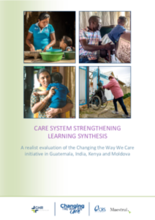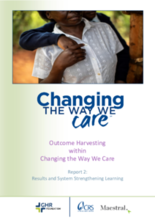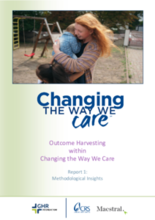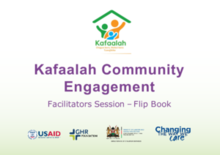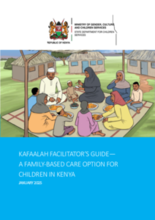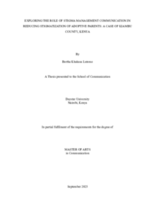This country page features an interactive, icon-based data dashboard providing a national-level overview of the status of children’s care and care reform efforts (a “Country Care Snapshot”), along with a list of resources and organizations in the country.
demographic_data
childrens_living_arrangement
children_living_without_bio
adoption
social_work_force
key_stakeholders
Key Stakeholders
Add New DataOther Relevant Reforms
Add New Datadrivers_of_institutionalisation
Drivers of Institutionaliziation
Add New Datakey_research_and_information
Key Data Sources
Add New DataChildren's Act, 2022 (Kenya)
Prevalence and number of children living in institutional care: global, regional, and country estimates
Social Protection and Disability in Kenya
Kenya Social Protection Sector Review
Country Care Review: Kenya
Child Developmental Disabilities, Caregivers’ Role in Kenya and Its Implications on Global Migration
Research findings on Alternative care system in Kenya for children without parental care
Charitable Children Institutions in Kenya: Factors Influencing Institutionalization of Children
Acknowledgements
Data for this country care snapshot was contributed by consultants with Maestral International.
Displaying 11 - 20 of 447
This report presents findings from an evaluation by Changing the Way We Care (CTWWC) that used a realist approach to examine how care reform progressed in Guatemala, India, Kenya, and Moldova across five key system components. It identifies advocacy, government ownership, collaboration, and capacity-building as major drivers of change and offers recommendations for governments and partners to embed family care in national systems, strengthen coordination and workforce capacity, and sustain reforms through evidence, shared learning, and long-term commitment.
This study examines the educational experiences of children in Charitable Children's Institutions (CCIs) in Kenya, highlighting how institutional care often fills gaps left by inadequate education and other services in contexts of poverty. Findings reveal that children in CCIs face marginalization, stigma, and disrupted learning, while promising interventions include cross-sector partnerships, safeguarding training, and transitioning CCIs toward community-based support within national care reform.
Changing the Way We Care (CTWWC) is a global initiative which promotes safe, nurturing family care for children.
On October 2, 2025, Kenya’s government, civil society organizations, and child protection practitioners met with Lumos Kenya to launch “costed, holistic and systematic care reform roadmaps” and case management process plans to transition children from institutional care into family‐ and community‐based care.
At the close of the Changing the Way We Care (CTWWC) The Changing the Way We Care (CTWWC) initiative launched in 2018 with the aim to reform child care systems by promoting safe, nurturing family-based care over institutional ca
At the close of the Changing the Way We Care (CTWWC) The Changing the Way We Care (CTWWC) initiative launched in 2018 with the aim to reform child care systems by promoting safe, nurturing family-based care over institutional ca
The Kafaalah Community Engagement Facilitator's Flipbook is a practical guide designed to support trained facilitators—such as Children Officers, Imams, Ustadh, Ustadhas, and other Muslim community leaders—in delivering community sessions on the Kafaalah. It offers structured guidance for engaging male caregivers, female caregivers, and children through interactive sessions.
The Kafaalah Facilitator’s Guide is part of a training package to strengthen understanding and implementation of Kafaalah, a family-based alternative care option for children in Kenya. Developed by the Government of Kenya with support from Changing the Way We Care, it provides structured session plans, tools, and activities to help child protection professionals and community members effectively promote and practice Kafaalah.
This package of materials on Kafaalah - was developed by the Government of Kenya in collaboration with Changing the Way We Care, UNICEF, and other key development partners and civil society actors.
This study explores how stigma management communication can reduce the stigmatization of adoptive parents in Kiambu County, Kenya, where cultural beliefs often privilege biological lineage over adoption. Findings reveal that adoptive parents use strategies such as concealment, disclosure, reframing, and advocacy to challenge stigma and gradually normalize adoption, highlighting the vital role of communication in transforming societal attitudes and promoting acceptance.

